Would you like to know which software is most esteemed for project management in the consulting sector? In this article, we will provide a short list, highlighting the features, strengths and weaknesses of some of the software programmes used in this context.
We will also try to highlight some of the key requirements that consulting agencies look for, or at least should look for, in a project management tool.
CONTENT
- Requirements – What do consulting agencies need in project management?
- 1. Budget and schedule planning
- 2. Support for different methodologies: Kanban, Scrum, Waterfall
- 3. Project portfolio management
- The solutions – The list of the best software for managing consulting projects
- 1. Twproject
- 2. Freedcamp
- 3. GanttPRO
- 4. Paymo
- 5. Wrike
- Conclusions: the strategic value of collaborative software in consulting
In the world of consulting, every project is a tailor-made challenge. Consulting agencies are called upon not only to respond to the explicit needs of their clients, but also to identify latent needs and build operational strategies capable of delivering real value.
This process always begins with careful listening and in-depth analysis: through dialogue, consultants gather expectations, critical issues and objectives.
Once a shared action plan has been defined, the operational work takes shape. At this point, the ability to adapt to the specific needs of each customer and to manage every phase of the project transparently and efficiently becomes crucial.
While these skills depend on the human expertise of the consultant, there are also tools that can amplify them and make them replicable, improving the productivity and quality of the service offered.
We are talking about project management software: technological solutions that help consulting agencies maintain control over budgets, timelines, workloads, priorities and objectives.
But what makes a project management tool truly useful for a consulting agency? What features are essential? And what are the best solutions available today?
In this article, we will explore precisely these aspects, starting with the essential requirements that project management software must have in order to effectively support the activities and projects of consulting agencies.
Requirements – What do consulting agencies need in project management?
Consulting agencies work on a multitude of projects, often in parallel, with distributed teams and different clients, each with their own priorities and dynamics.
For this reason, choosing a PM tool cannot be done at random: it must meet specific requirements in terms of flexibility, control and strategic vision.
Here are the three fundamental requirements that good project management software should offer a consulting firm:
1. Budget and schedule planning
Every project must be planned in detail, with a clear overview of the resources involved, the expected costs and the timeline.
The ideal tools allow you to build Gantt charts or timelines, monitor the progress of activities, manage costs in relation to the available budget, and identify any bottlenecks or critical delays.
This level of control allows for more careful management of deadlines and more effective communication with customers.
2. Support for different methodologies: Kanban, Scrum, Waterfall
Consulting agencies often have to adapt to the client’s working methods or the characteristics of the project itself.
Good PM software should therefore offer methodological flexibility, supporting agile approaches (such as Kanban or Scrum), but also more traditional ones.
This is useful both for dividing work into assignable tasks and for facilitating the reporting of hours worked, tracking responsibilities and ensuring the operational autonomy of teams.
3. Project portfolio management
The big picture is one of the most critical aspects for consulting agencies that manage multiple clients and projects simultaneously.
The ability to analyse the entire portfolio, assess its strategic impact, ROI, or progress against business objectives enables more informed decisions to be made.
An effective tool should offer dashboards and dynamic reports to keep the overall direction under control and intervene promptly when necessary.
The solutions – The list of the best software for managing consulting projects
Here is our short but comprehensive list of tools that we believe help business consultants optimise their working time, ensure transparency among employees and towards customers, and maintain an up-to-date overview.
1. Twproject
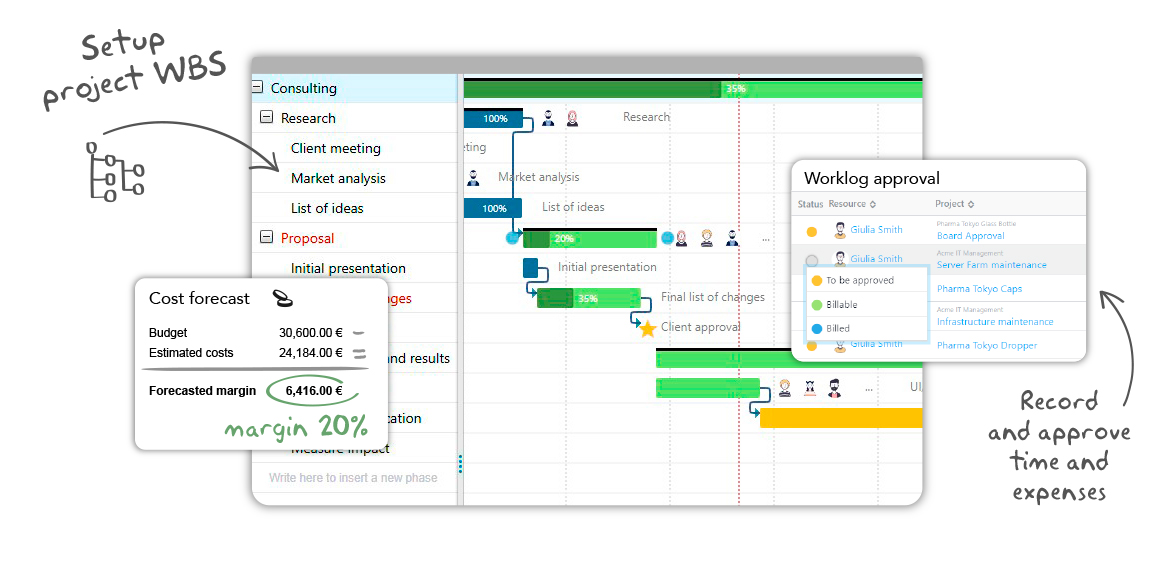
Thanks to software such as Twproject, all these operations can be carried out in a centralised manner on a single platform, ensuring that all customer and project management is at the fingertips of team members, with specifications according to their role.
The platform provides access to the entire history of customer interactions, complete documentation and a detailed timeline of project phases.
Twproject is therefore the ideal software for those who manage multiple clients, such as consulting teams, because thanks to a good alert and notification system, it helps keep track of timelines and deadlines, with an eye on the budget and resources.
Key features:
- Lead management: when used as a CRM, Twproject allows you to save customer data from the pre-sales phase, enabling you to transform pre-sales projects into operational projects, transferring costs and documentation.
- Project types: possibility to distinguish between routine, spot or operational projects.
- Cloning and templates: to optimise work in the case of repetitive projects.
- To-do: agile project activity management mode, assignable to resources with documentation, mentions and deadlines.
- Workload management: to assess the availability of a resource to take on a project or customer.
- Gantt with retrospective timeline: allows you to monitor timelines and compare them with initial forecasts.
- Public project page: to show clients selected project data, with messaging function, without the need to log in.
- Timesheets: customisable, exportable and shareable.
- Cost management: advanced financial planning tools to keep track of estimated and actual budgets for each phase and project and to monitor expenses and revenues.
- Portfolio management: to get an overview of ongoing projects in terms of various aspects (time, financial and human resources) with an advanced filtering and planning system.
Costs: from €4.89 per user/month.
Pros: ideal for managing consulting projects as it centralises information and ensures transparency and communication between all parties involved; excellent process optimisation features.
Cons: none detected.
The ultimate collaborative tool: it fits different working methods and mixed teams with multiple clients spread across multiple sectors.
2. Freedcamp
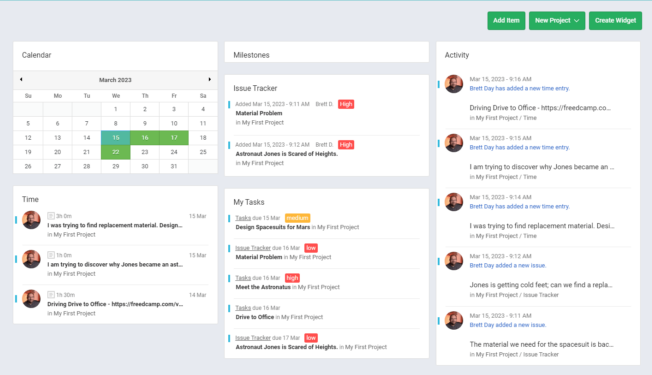
Freedcamp is a project management platform designed to help consulting teams plan, organise, and monitor project activities.
It offers an intuitive interface and a wide range of tools that allow you to manage complex projects, assign tasks, track deadlines and collaborate with clients and colleagues in real time.
For consultants, who often work on multiple projects simultaneously with different stakeholders, Freedcamp provides a flexible and scalable solution. Customisable modules allow you to tailor the platform to your team’s specific needs, improving productivity and transparency.
Key features:
- Project management: with list, kanban or Gantt view.
- Assignments: of tasks, subtasks and dependencies.
- History management: time tracking and management of billable time.
- Shared calendar: with deadline management.
- Integrations: Google Drive, Dropbox, OneDrive, Zapier and other tools.
- Documentation: document management system.
- Collaboration tools: discussions, mentions and real-time notifications.
- User roles: customisable and with access controls.
Costs: business version starting at $7.49 per user/month.
Pros: extensive customisation and modularity; good time and resource management.
Cons: the interface can be confusing at first.
Helps manage consulting projects with clarity, flexibility and control.
3. GanttPRO
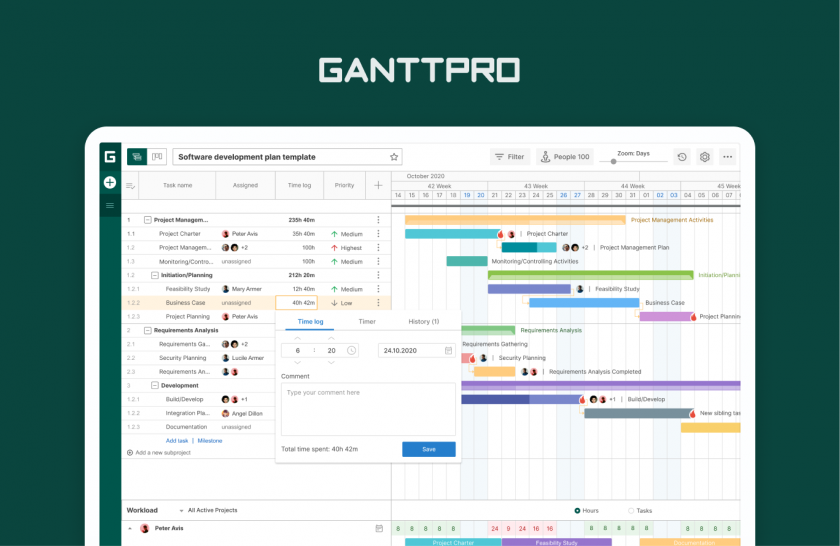
GanttPRO is a Gantt chart-based project management software designed for teams looking for clear and structured planning.
It is particularly useful for consulting teams that need to coordinate activities, resources and deadlines in a visual way, while managing multiple projects with different clients. The simple yet powerful interface allows you to keep track of work progress and dependencies between tasks.
For consultants, GanttPRO offers useful tools for estimating time and costs, monitoring resource allocation, and collaborating transparently with clients and stakeholders. The ability to create detailed, shareable schedules makes it suitable for presentations and reporting as well.
Key features:
- Gantt charts: interactive and easy to use
- Task management: with dependencies, milestones and priorities
- Planning: time tracking and cost estimation
- Collaboration: real-time with comments and notifications
- Human resource management: resource allocation and workload balancing
- Timeline: project change history and versions
- Export: to PDF, PNG, Excel and sharing via link
Costs: from $7 per user/month.
Pros: easy to use even for non-technical users; good export and presentation features.
Cons: less flexible for those who do not work primarily with Gantt charts.
Visual planning for organised consulting teams and those who work to deadlines; may not be suitable for all teams.
4. Paymo
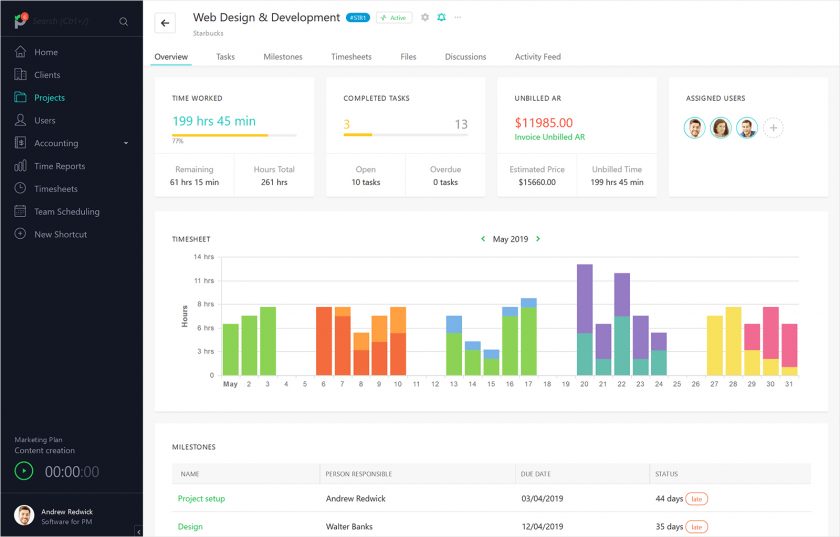
Paymo is an all-in-one software designed to support consulting teams in managing projects, tasks, time and billing. It combines project management, time tracking and billing tools in a single platform, offering a complete overview of the work cycle. It is ideal for consultants looking to centralise operational management without resorting to multiple separate applications.
Thanks to its modular structure and modern interface, Paymo allows users to coordinate team work, monitor hours worked, create quotes and generate invoices in a few clicks.
The ability to see both the productivity and profitability of projects makes it particularly useful for those who work with clients on an hourly or project basis.
Key features:
- Project management: with Kanban, Gantt, calendar and list views.
- Integrated time tracking: manual and automatic.
- Resource planning: monitoring of timelines and workload.
- Invoicing management: creation of customisable quotes and invoices.
- Cost management: monitoring of project costs and profitability.
Costs: from $5.9 per user/month.
Pros: modern and well-organised interface; good solution for teams working on an hourly basis or with project rates.
Cons: Some features take time to configure properly.
A practical and comprehensive solution, but more suitable for teams that are already well organised.
5. Wrike
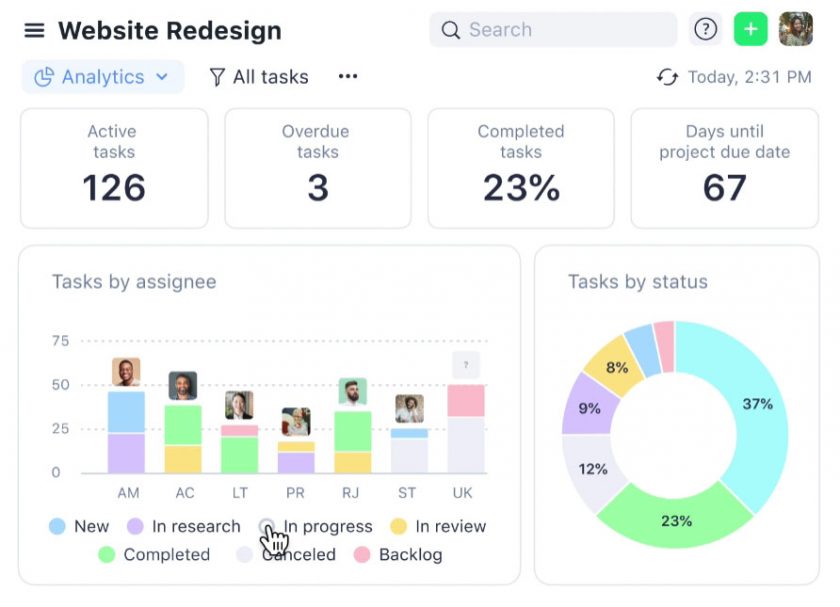
Wrike is a project management platform designed for teams managing complex, multi-functional projects. For consulting teams, it offers a powerful combination of task management, collaboration, time tracking and advanced reporting. It is suitable for organisations that need a solid structure and complete visibility across the entire workflow.
Thanks to its flexibility, Wrike allows you to organise work with different views (lists, Gantt charts, Kanban boards), integrate external tools and customise dashboards and workflows according to the needs of the team or customer.
It is particularly useful for medium-sized or large consultancies that need to manage multiple projects simultaneously and coordinate distributed teams, but for smaller teams it is perhaps too complex a solution, thus appearing at the bottom of our ranking.
Key features
- Multiple views: list, Gantt, Kanban, calendar.
- Time tracking: integrated with resource management.
- Automation: for customisable workflows and rules.
- Dashboard: with customisable features.
- Reporting: advanced and real-time.
- Collaboration: comments, mentions and approvals.
- Security and access control: for enterprise teams.
Costs: from $5.9 per user/month.
Pros: highly scalable and suitable for large teams; powerful automation and reporting for project control.
Cons: steep learning curve for new users; expensive advanced plans for smaller or independent teams.
Powerful and customisable, but may be excessive for less structured teams or those with simpler needs.
Conclusions: the strategic value of collaborative software in consulting
In conclusion, choosing the right project management software for consulting means focusing on tools that promote time optimisation, transparency of activities and smooth communication between team members and with clients.
The complexity of a diverse team can be best managed through centralised, shared platforms that enable continuous monitoring and the adoption of standardised processes, without stifling creativity and personal initiative.
Furthermore, the use of software allows you to collect and analyse valuable data that is often inaccessible using traditional methods. In this context, a collaborative tool is not just a support, but an essential element for the success and sustainable growth of consulting projects.
PMs who use Twproject say that adopting a project management tool was an investment that paid off within a few months and made work much less distracting, facilitating collaboration and communication.
Twproject’s ease of use has allowed us to find the perfect balance in the organisation of our projects: even our least experienced collaborators have learned to manage their project phases independently and effectively.

And it is because of feedback like this that we have no hesitation in recommending that you try Twproject to manage your consulting projects more effectively: you will receive a free 15-day trial to start using all of its project collaboration tools, and you will be able to take advantage of the advice of our support team.



